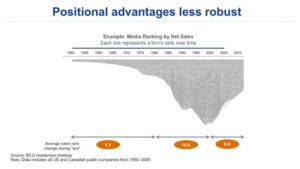
Which business models are most affected by digital?
In most industries, the competitive landscape is rapidly changing and as a result, companies speed through their life-cycles at an unprecedented pace (actually twice as fast as 20 years ago, according to recent BCG research).
Not only are whole industries being disrupted – media and entertainment, energy and retailing, to mention a few – but the changes within industries are also faster than ever.
The figure below shows the massive changes in the media industry in North America from 1950 to 2010. It illustrates a more general picture of what we see across most industries. We see that companies are jostling within industries at an ever-increasing pace.

Digital is the main driver of the current changes upending the business world. Digitization affects all aspects of our lives; the way we work, the way we live and the way we consume. Much has already been said about digital. However, in the midst of all the technological hype/fantasizing/speculation, we believe that business leaders need to clearly understand how digital enables more effective business models.
A business model articulates how a company creates value for its customers and manages the costs of production and delivery. There are many different business models out there. In some way every business has its own. However, there are four important archetypical business models that are most affected by digital:
Resource sharing platforms
First, resource sharing platforms insource physical, informational, and human resources. Classical examples include shared facilities or labor pools, but this is a current fast growing set of services covering all business functions ranging from IT and HR to facility management and contract manufacturing.
The logic of resource sharing is compelling – by leveraging the total scale in the delivery of a given process across clients, the provider can drive up value through reliability, development and quality at the same time as they can drive down costs through shared technology platforms. Digital is a major enabler because the firm can build global delivery at scale, while also offering relevant data and higher delivery quality. Services through resource sharing is a scale and platform game where the winner will be the one who is able to drive scale in customers and utilize technology platforms to deliver. IBM has been there for a long time, so has ISS, Securitas and all large Enterprise Resource Planning players. Whereas the early 20th century was the era of mass production of products (from cars onwards), the early 21st century is the time of mass “production” of services. Digital is the game changer as it enables scale, quality, data processing, machine to machine communications and sensor based surveillance. And we are just seeing the beginning!
Networking services
As interesting, and perhaps even more important, is the explosion in networking services enabled by digital technologies. Networking services are often found in established industries such as transportation, banking, and the operation of market places and exchanges. But now, digital technologies have enabled incredibly effective development and operations for these types of services. Networking services is probably the business model most often associated with disruption because it allows for completely new ways of delivering value. Think about the following famous disruptors: Spotify, Netflix, Uber, AirBnB, Amazon, eBay, Facebook, and Google – to name a few. Despite appearing at different times, they all have many similarities. They all outcompeted incumbents without producing end products or services. They created highly efficient networking mechanisms that allowed for large scale sharing and involvement by multiple product or service suppliers. In a way, they created clubs that became huge and whose network effects are a key part of their value. They connected people, companies, and places. Their users, or “members”, wanted to be part of the largest network because it provided the best connectivity, the richest offerings, access to the most people and places. These network service firms also all completely outcompeted the incumbents in the technology arena, providing platforms that reach huge global scale fast and drive cost to deliver equally fast. And finally, don’t be surprised that Uber subsidizes drivers. Network rollout is the largest investment in networks, and they know so well that these are “winner takes all” games!
Problem solving companies
Another group of service firms known as problem solving companies, is also being transformed by digital. These are the law firms, the management consultants, the architects, the engineers, the health care services, the certifiers, the analysts, and more. All these professional services are becoming much more efficient through the use of digital tools, global databases, collaboration platforms, and communication solutions. Digital technologies can augment, and in some cases, replace professionals. But more often, they allow one-man firms to be efficient, by allowing virtual networks to form instantly and enhance the efficiency of the operations of global players like EY and Deloitte in area of auditing, consulting and taxes, McKinsey and BCG in top management consulting, as well as DLA Piper and Baker & McKenzie in the law and compliance sector. They all know that if they don’t quickly become fully digital, they will decline rapidly and be overtaken by competition and become irrelevant. Digital is a necessity inside such firms and a requirement in their markets. Their clients expect to be working with companies that are one step ahead, not two steps behind.
Manufacturing firms
Finally, are manufacturing firms less influenced by digital? Not at all. Most would say that manufacturing, robotics, automation, 3D printing, sensors and digital platforms will allow for a fourth industrial revolution that brings about mass customization – an economy that transcends the traditional trade-off between scale and customization. This revolution also breaks down the traditional ideas driving globalization, allowing for instant local production and development at low cost. The challenge for industrial firms is twofold. First they need to embrace digital fast, like GE is doing. Second, they need to embrace disruption and not be defensive, like the car producers were with electric and self-driving cars.
These are the four business models which will be the most affected by digital. In other sectors we also see that digital allows firms to develop new business models (like Amazon branching out into cloud services), or transform business models entirely (as IBM did in moving from products to services and now again into analytics). We also see that digital allows firms to disrupt themselves (Netflix continuously moving to the next delivery platform is a good example).
In sum, the overriding challenge for all firms is to recognize that digital will transform the way they create value very fast, not “hope it will pass” or “not be that important”. We need to recognize that:
- All Business models will be digital.
- Digital will accentuate the core logic and make business models even more important.
- Digital will also affect the organizational design in different business models in specific ways.
- Finally the process of digitization has to be aligned with the logic of the business.
Knut Haanaes is Professor at IMD.
Øystein D. Fjeldstad is professor and Telenor Chair of International Strategy and Management at BI Norwegian Business School.
Research Information & Knowledge Hub for additional information on IMD publications
Medacta Group SA is a rising star in the orthopedics market, achieving global success through innovative products and techniques, with a particular emphasis on minimally invasive techniques that bring meaningful value to its patients. With its app...
IMD produces a yearly Smart City Index offering a balanced focus on economic and technological aspects of smart cities on the one hand, and “humane dimensions” of smart cities (quality of life, environment, and inclusiveness) on the other. In this...
in I by IMD
Research Information & Knowledge Hub for additional information on IMD publications
Case reference: IMD-2663 ©2025
Research Information & Knowledge Hub for additional information on IMD publications
Research Information & Knowledge Hub for additional information on IMD publications
Research Information & Knowledge Hub for additional information on IMD publications
Research Information & Knowledge Hub for additional information on IMD publications
IMD World Competitiveness Center Report, 8 April 2025
Research Information & Knowledge Hub for additional information on IMD publications
Research Information & Knowledge Hub for additional information on IMD publications
Research Information & Knowledge Hub for additional information on IMD publications
Research Information & Knowledge Hub for additional information on IMD publications
Case reference: IMD-2650 ©2025
Research Information & Knowledge Hub for additional information on IMD publications









